May 17, 2025 | 21:48 GMT +7
May 17, 2025 | 21:48 GMT +7
Hotline: 0913.378.918
May 17, 2025 | 21:48 GMT +7
Hotline: 0913.378.918
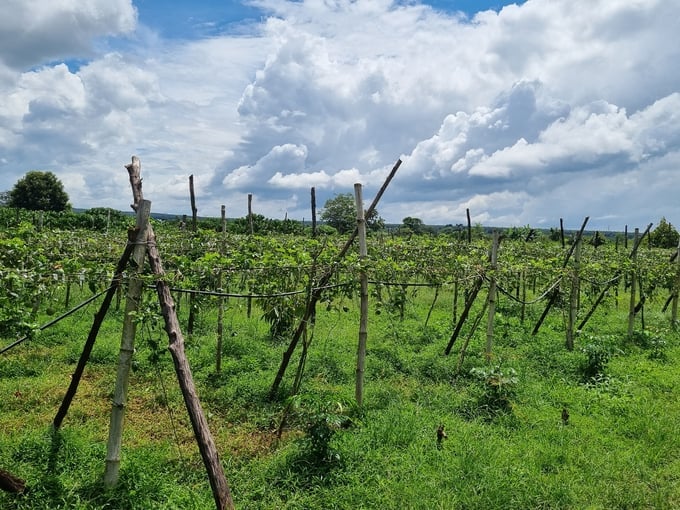
Passion fruit has fallen in price, making people less interested in caring for their gardens. Photo: Tuan Anh.
The area of passion fruit cultivation in Gia Lai increased too quickly, causing excess output, leading to a sharp drop in prices, and people considering switching to other crops.
At the beginning of 2023, the price of scooped fruits (extracted fruits) in Gia Lai province increased to a record high of about 20,000 - 22,000 VND/kg. The price of passion fruit increased, providing a stable source of income for growers, so many households have raced to expand their cultivation area.
Since then, the craze for growing passion fruit has spread everywhere; old coffee gardens have been replaced to grow passion fruit. Massive planting decreased the price of passion fruit, causing people to suffer due to unsecured output. In the past four months, the price of passion fruit in Gia Lai has dropped sharply, sometimes even only about 3,000 VND/kg. Currently, the price of passion fruits is at 5,000 VND/kg.
The passion fruit price has dropped, and people are considering switching to growing other crops. It was noted that in localities with large passion fruit growing areas in Gia Lai, such as Dak Doa, Chu Pah, Ia Grai, and Mang Yang districts, many passion fruit gardens are not cared for, so the quality has seriously decreased.
Along the roads from Ia Nhin commune to Ia Ka and Ia Mo Nong (Chu Pah district), many passion fruit gardens are not cared for, the leaves are yellowing, and the fruits are gradually fading. According to research, the sharp decline in passion fruit prices, along with the rising cost of fertilizer supplies, makes many households not invest in their passion fruit gardens.
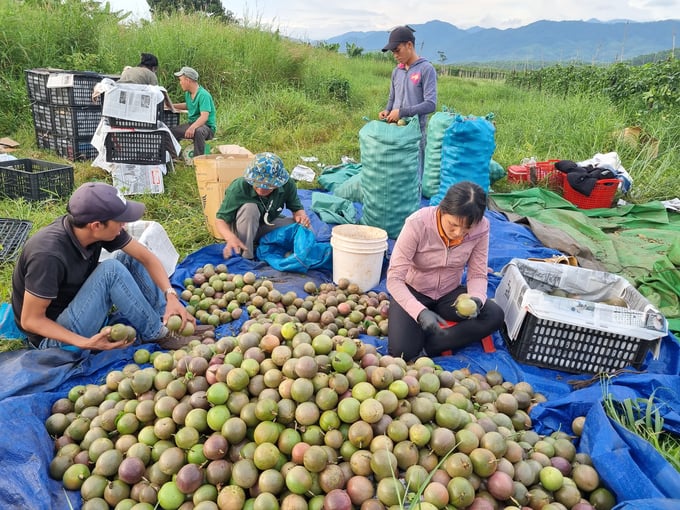
Currently, fruits are purchased by traders at a price of about 5,000 VND/kg. Photo: Tuan Anh.
Mr. Pham Thanh Son (Bui village, Ia Ka commune) said his family has four children growing passion fruit. Some people grow more than 1 hectare; some grow about 1,000m2. Previously, the price of passion fruit increased, so his children switched from coffee to passion fruit. At that time, the income was very stable all year round, even making billions of dong from passion fruit trees.
“Currently, the passion fruit gardens are old, so they are being demolished. My daughter has switched passion fruit to replanting coffee, and my sons are also wondering whether to continue growing passion fruit or switch to other crops,” Mr. Son shared.
Also, because of low prices, the concrete roads running into the passion fruit production area of people in Ia Mo Nong commune are more gloomy.
Mr. Pham Van Truong’s family (Mon village, Ia Mo Nong commune) has more than 1 hectare of old coffee trees, which were later replaced by passion fruit. Now the price of passion fruit has dropped dramatically, Mr. Truong doesn’t bother to take care of it, letting the fruit fall all over the garden. Below the passion fruit garden, grass grows all over the path.
Mr. Truong said that after demolishing the old coffee garden, during land reclamation, his family switched to growing passion fruit with the hope of increasing their income. But before he could harvest, the price of passion fruit fell dramatically, and his family lost everything.
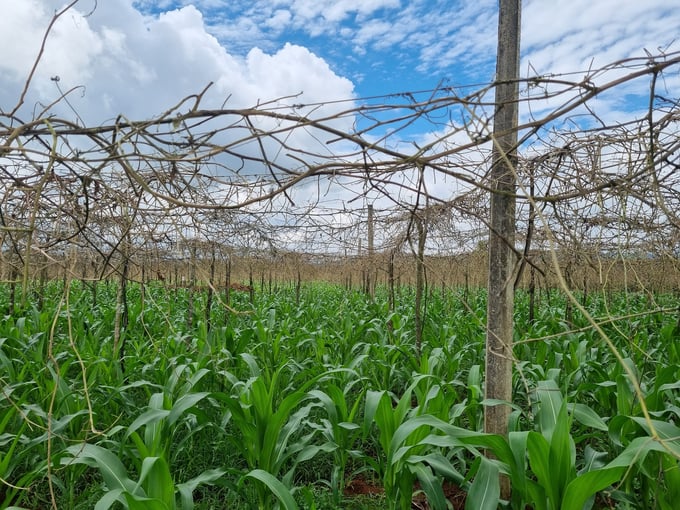
The passion fruit gardens are withered, and people grow corn below. Photo: Tuan Anh.
“I invested nearly 200 million VND, but my family only got back a few million VND. We will probably have to destroy the passion fruit garden to replant coffee. Anyway, coffee is still the main crop, the market is stable, and prices are increasing,” Mr. Truong shared.
Currently, the Central Highlands region is the country’s primary passion fruit growing area with nearly 9 thousand hectares, accounting for more than 86% of the country's area. Among them, Gia Lai province is the locality with the largest area of passion fruit, with more than 4,680 hectares and an average yield of nearly 42.6 tons/ha. To date, passion fruit in Gia Lai has been granted 32 growing area codes, with a total area of more than 877 hectares, and five passion fruit packaging facility codes for export, with a total capacity of about 230 - 255 tons of fruit/day.
Similarly, in Ia Grai district, along the inter-district road from Ia Yok commune to Ia Ba and Ia Hrung communes, many households almost abandoned their passion fruit gardens. Here, the passion fruit gardens are withering day by day. The fruit is not cared for, so it is no longer plump. In addition, in recent days, there have been frequent rains in the area, so fungi and insects have attacked the fruits.
As noted by reporters, many passion fruit gardens are almost abandoned. Occasionally, there are people in the garden who do not care for passion fruit but are improving the land to consider planting other plants.
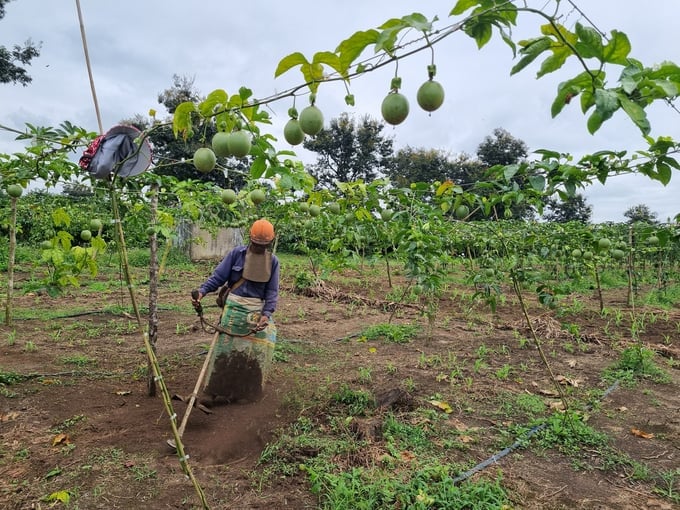
Mr. Dang Van Thoa’s family (Ia Ba commune) is plowing the land in the passion fruit garden to prepare for intercropping beans. Photo: Tuan Anh.
With more than 8 acres of passion fruit planted, Mr. Dang Van Thoa’s family (Ia Ba commune) harvested the first batch of fruit with a yield of about 1 ton. After that, the passion fruit encountered prolonged rains, causing the quality to gradually decline. Coupled with the dramatic decline in passion fruit prices, his family is not interested in investing in care.
“Previously, my family invested over 100 million VND to grow passion fruit. Now it is considered a loss. After harvesting as much as possible, we will consider planting another tree. While waiting for the next harvest, my family will grow short-term crops like soybeans to earn the fastest income,” Mr. Thoa shared.
Mr. Le Van Thanh, Director of Ia Mo Nong Production - Trade - Service - Agricultural Tourism Cooperative (Ia Mo Nong commune, Chu Pah district), said that people understood the risk of overplanting but still did it.
From April to May 2023, people massively planted the trees, leading to excess passion fruit production. On the other hand, passion fruit from the provinces of Dak Lak, Dak Nong, and Lam Dong brought to Gia Lai is consumed in large quantities, leading to oversupply, and causing the price of passion fruit to plummet.
As passion fruit prices dropped, people rushed to destroy them, because they were afraid they would not be able to recover their investment. “When a lot of passion fruit is destroyed, the supply to the market will decrease sharply, and the price of passion fruit may increase again in the near future. Therefore, people who patiently take care of themselves will likely achieve success in the future,” Mr. Thanh predicted.
According to analytical data of factories supplying passion fruit varieties, the passion fruit harvested in the Central Highlands provinces is about 18,600 hectares (1 hectare/650 trees). Accordingly, 1 hectare yields more than 30 tons/year (equivalent to an estimated total output of about 558,000 tons/year, or an average of 1,550 tons/day). Meanwhile, the total market demand for passion fruit raw materials for processing and bringing to factories is only about 1,100 tons/day. Looking at the data, we can see that the demand for passion fruit at factories is much lower than the amount of passion fruit supplied to the market.
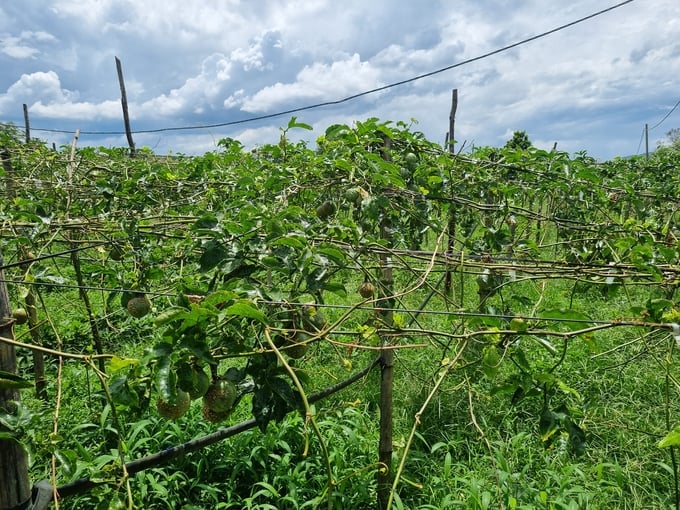
Forgotten passion fruit gardens in Chu Pah district. Photo: Tuan Anh.
Mr. Nguyen Cong Son, Head of the Department of Agriculture and Rural Development of Chu Pah district, said that grade 1 passion fruit that meets export requirements to Europe is still priced at more than 20,000 VND/kg. However, passion fruit prices are falling dramatically. The reason is that in recent times, unfavorable weather and prolonged rain for many months have caused poor quality passion fruit and poor extraction, so businesses buy it at low prices.
According to Mr. Son, passion fruit in the area is mainly intercropped, not altogether chasing profits but destroying coffee, rubber or other crops. Previously, the district Department of Agriculture and Rural Development advised people not to destroy coffee gardens to grow passion fruit. Afterwards, people became aware of this, so they turned to intensive farming, taking advantage of growing passion fruit to increase their income.
“At the end of the year, the price of passion fruit may increase, so many households are preparing to plant it again. To avoid failure, we recommend that people participate in the chain of linkages with cooperatives and businesses so that consumption and prices are stable. Besides, people also need to focus on quality production instead of mass planting,” Mr. Son said.
In November 2023, Vietnam Agriculture Newspaper, the Department of Agriculture and Rural Development of Gia Lai province and related units under the Ministry of Agriculture and Rural Development will coordinately organize the Forum “Identifying the current situation of passion fruit production, processing and consumption, and Solutions to develop the sustainable passion fruit industry.” Within the framework of the Forum, the Campaign Committee of Gia Lai Province Passion Fruit Association will be launched. The forum will be livestreamed in Gia Lai province and broadcast to about 500 places nationwide.
Translated by Quynh Chi

(VAN) Muong Nhe Nature Reserve hopes that being upgraded to a national park will lay the foundation for forest protection efforts to be carried out in a systematic, modern, and sustainable manner.
/2025/05/16/3923-2-171845_52.jpg)
(VAN) Lower costs, higher yields, and improved soil quality are outstanding benefits that soybeans bring when integrated into the crop rotation system.

(VAN) The 'For a Green National Environment' programme aims to promote a green lifestyle, support businesses in implementing ESG practices, and turn Net Zero commitments into concrete actions.

(VAN) Cold-barn systems efficiently manage environmental and temperature conditions, which aids in the prevention of respiratory diseases in pigs and protects them from the vectors that transmit African swine fevers.

(VAN) To tackle challenges, the project 'Addressing key technical bottlenecks in the grouper supply chain in Vietnam' has been underway since 2024.

(VAN) The project 'Disease-Resilient and Sustainable Cassava Production Systems in the Mekong Region', funded by the Australian Center for International Agricultural Research (ACIAR), is being implemented from 2024 to 2028.

(VAN) Data from 10,000 farming households will help professionalize production organization and support the implementation of the One Million Hectares Program for High-Quality, Low-Emission Rice Cultivation.